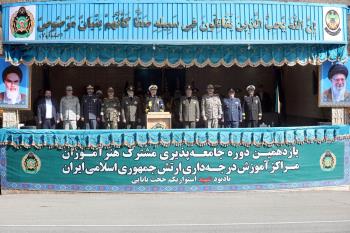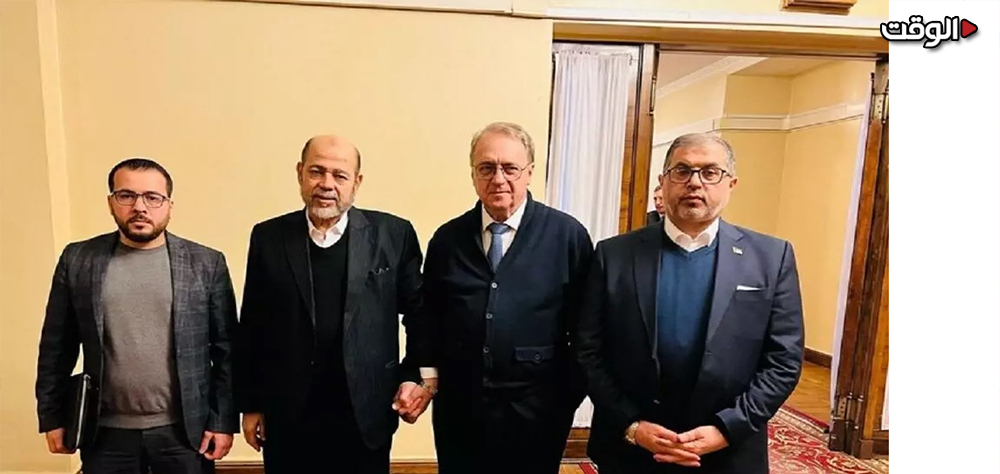Russia's decision to host Palestinian groups during the Gaza conflict not only highlights the importance of Palestine in the nation's foreign policy agenda but also presents an opportunity for Russia to reaffirm its role as a more equitable mediator compared to the United States, whose efforts towards a two-state solution have faltered.
ALWAGHT- Amid the escalating atrocities committed by the Zionist regime in the Gaza Strip, which have transformed this narrow territory into a scene of extensive destruction and devastation, major powers are showing unprecedented focus on the Palestinian conflict.
Russia is among the nations carefully monitoring the developments in Palestine. In addition to its recent diplomatic endeavors and support for anti-Zionist resolutions in the Security Council, Russia has extended invitations to Palestinians.
In this context, Mikhail Bogdanov, Deputy Foreign Minister of Russia, disclosed that leaders of Hamas, Islamic Jihad (PIJ), Fatah, and other Palestinian factions have been invited for discussions in Moscow on February 26 regarding the Gaza conflict.
Bogdanov emphasized Russia's broad engagement with various Palestinian groups and noted that leaders from Syria, Lebanon, and other countries will also attend. He announced the participation of 12 to 14 organizations in the conference to address the Gaza conflict and Palestinian affairs, including international efforts for ceasefires, humanitarian assistance, and the two-state solution.
Azzam al-Ahmad, the leader of the Fatah Council, stated that all factions positively responded to Russia's invitation, and Hamas officials also affirmed that a delegation led by Mousa Abu Marzouk, a member of the movement's political office, will attend this session. This marks the initial gathering of Palestinian groups since the commencement of the Gaza war on October 7. Palestinian leaders will have the opportunity to propose solutions in Moscow and confront the Zionist adversary.
Russia's stance against the Zionist regime's aggression in Gaza is crucial for advancing stability among the besieged Palestinians. Russians have consistently condemned Zionist attacks on Gaza and advocated for an end to the conflict.
In the preceding month, a Hamas delegation led by Mousa Abu Marzouk made its second trip to Moscow since the onset of the Gaza war. They discussed Palestinian developments, including the release of Zionist prisoners and cessation of hostilities, with Russian officials.
Terrifying Tel Aviv
Amidst the Gaza war, Moscow's invitation to Palestinian groups underscores the strained relations between Russia and the Zionist regime in recent years. The Kremlin's condemnation of Israel's actions, alongside its criticisms of Israeli activities in Ukraine and efforts to provide military support, including intelligence equipment, are notable factors that cannot be ignored. This has even prompted direct criticism of Tel Aviv by Russian authorities.
Russia even took steps last summer to antagonize Israel by closing the "Jewish Agency" office in Moscow and immediately hosting Hamas leaders, which sparked the anger of the Zionists.
The Gaza conflict has presented Russia with a chance to strengthen ties with Palestinian factions and solidify its role in Palestinian affairs. Additionally, it allows Moscow to maintain its tough stance against Tel Aviv, despite its involvement in the Palestinian issue, which contradicts Zionist principles. This aspect has become integral to Moscow's broader regional strategies and cannot solely be attributed to recent tensions over Ukraine.
Restoring Russia's role as a mediator and the erosion of the West's influence
Previously, Russia had not played a significant role in Palestinian affairs and had only aimed to act as a mediator in reconciliation efforts between Palestinians and the Zionist regime when necessary. However, with the increasing distrust among Palestinian groups and Arab countries supporting reconciliation, with the impartial mediation of the United States for the formation of an independent Palestinian state, notably through actions such as recognizing occupied settlements, accepting al-Quds as Israel's capital, closing its autonomous office in US territory, and repeatedly vetoing resolutions in favor of the regime in the UN Security Council, Moscow has seized an opportunity in recent years to demonstrate impartial mediation and active involvement in Palestinian affairs as part of its return-to-the-Middle-East policy.
Russia seeks to establish a significant role in fostering global peace and stability by actively engaging in this enduring conflict. The global community echoes the demand for recognizing the Palestinian state within the 1967 borders, a policy that could bring Moscow closer to Arab nations. Throughout the recent Gaza war, Moscow consistently proposed fundamental solutions to the crisis, advocating for the formation of a Palestinian state and the realization of Palestinian rights.
Furthermore, Russia's support for Palestinians is perceived as a challenge to the West, particularly the United States, which staunchly backs Israel's actions against Palestinians. Analysts suggest that Russia's primary diplomatic objective is to undermine the Western global order, with Kremlin leaders' accusations of Western destabilization and the resurgence of historical conflicts contributing to the expansion of the anti-Western front.
Sergey Lavrov, Russia's Foreign Minister, addressed this matter in his recent remarks, emphasizing the need to find a solution to prevent disasters. He pointed out that American counterparts are steering Palestine, Israel, and the entire Middle East towards catastrophe. Lavrov highlighted the entrenched stance of Israeli leaders on continuing military operations in Gaza and their extension to Rafah, indicating the absence of prospects for peace or swift stabilization in the region. This situation underscores heightened tensions and escalating concerns among stakeholders.
The conflict between the Zionist regime and Hamas has not only bolstered the Kremlin's aspirations to reshape the international perception of the Ukraine conflict but has also deepened the conviction that the Western-established global order is in decline. From the outset of the Gaza conflict, Vladimir Putin has consistently emphasized that this conflict serves as evidence of America's shortcomings in West Asia.
The United States' support for Tel Aviv has diminished due to various factors, which the Western powers utilize to garner backing for Ukraine among the populace in the South. The West's ethical stance against Russia's invasion, especially apparent to Middle Eastern observers witnessing America's unwavering backing of Israel's actions in Gaza and the southwestern coast, has lost its credibility. In a scenario where Washington condemns Russia for alleged genocide in Ukraine while actively engaging in the activities of the Zionist regime in Gaza, America's duplicity holds no sway over global opinion.
Hence, enhancing connections with Palestinian factions may contribute to shaping a new alliance, diminishing America's sway in the region, and creating an avenue to challenge Washington's dominance and its independent policies globally, with the objective of reinstating a multipolar framework in the international stage, a strategy mirrored by Russian leadership in recent months.
Simultaneously, the establishment of an autonomous Palestinian state, regardless of the endorsement of UN constituents and the Zionist authority, is intertwined with internal Palestinian dynamics. Given the fundamental disagreements between autonomous entities and groups like Islamic Jihad and Fatah, which they are reluctant to include in future administrations, Kremlin officials aim to unify them under a common front by bridging gaps among Palestinian leaders.
Kifah Harb, a member of Fatah's Revolutionary Council, also welcomed endeavors toward fostering unity among Palestinian factions, expressing, "Russia holds a pivotal position in the global order, and its supportive role garners recognition and gratitude from all Palestinians."
Ayman al-Raqab, a political science professor in Palestine, further elaborated in an interview with Sputnik News, stating, "Moscow's proposal for hosting national reconciliation talks regarding Palestine during this critical juncture signifies a significant stride toward the imperative of internal Palestinian unity."
Contrary to Western perceptions that label Hamas as a terrorist movement, Russians consider it as part of the Palestinian community that has been able to defend Palestinian lands against occupation. Russia initiated its relations with Hamas in 2005 and has expanded its level of cooperation with Hamas over the past two years, evidenced by its repeated hosting of leaders of this movement.
While Moscow recognizes autonomous bodies as legitimate representatives of the Palestinian people, it believes that Hamas should also be part of the two-state solution. Russia's invitation and the support of some regional actors for Hamas somewhat elevate the international standing of this movement, and such global support can also be influential in advancing Gaza's resistance plans against Zionist occupiers. This is because Zionists only recognize the Palestinian Authority, are prepared to engage in bilateral discussions with them, and expect other countries to comply with this approach. However, legitimizing Hamas and other resistance groups poses a threat to Israel's interests in the region and the world.
Final Words
During the Cold War period, Russia maintained a distance from events unfolding in the Middle East, leading to this strategically vital region being largely under the influence of America. However, over the past decade, West Asia has emerged as a primary focus for Russia. Active participation in the Syrian conflict served as a catalyst for Russia's significant engagement in West Asia. With the country's confrontation with the West escalating across various fronts, Kremlin leaders perceive the current conditions as conducive to influencing developments in the region.
Given that the Palestinian cause and the quest for the liberation of al-Quds rank high among Islamic nations' priorities, Russia aims to bolster its standing among these nations by supporting the oppressed Palestinian people. Through this support, Russia seeks to secure backing from Islamic countries and regional public opinion. These objective gains particular significance as Russia has unveiled a new doctrine focused on expanding ties with West Asian countries, underscoring the heightened importance of involvement in issues like Palestine.



























